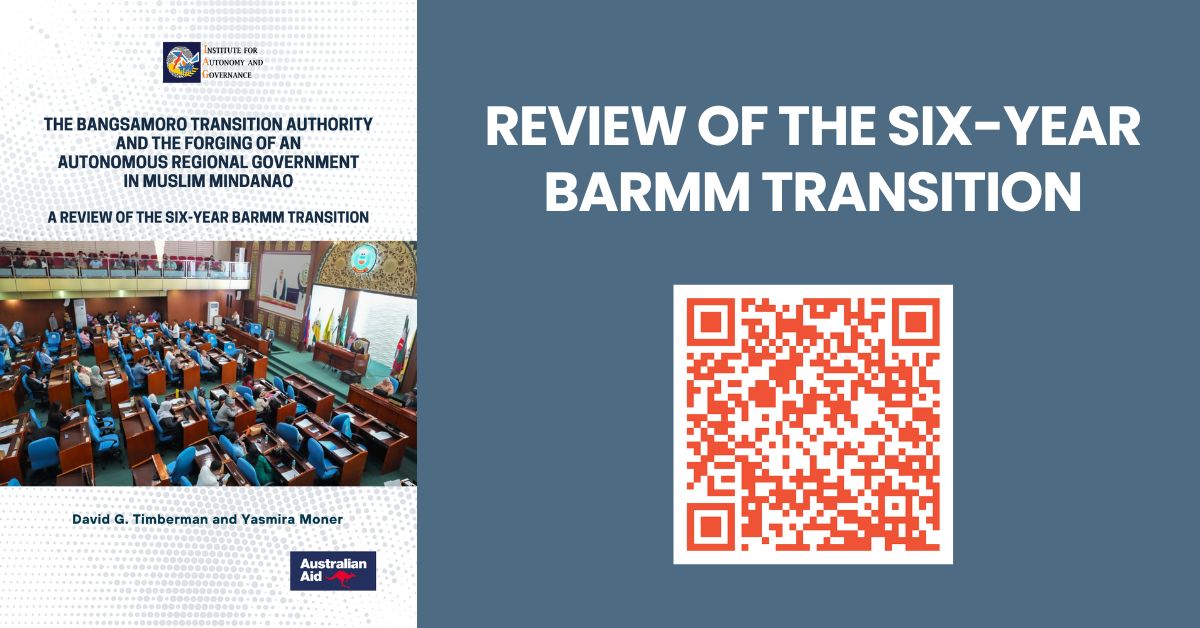Groundbreaking Report Examines the Challenges to Autonomous Government in the Bangsamoro
- Details
- IAG Philippines

Cotabato City, Philippines – July 30, 2025 – The Institute for Autonomy and Governance (IAG) released today an independent assessment of governance in the Bangsamoro Autonomous Region in Muslim Mindanao (BARMM). The report offers the first comprehensive review of the six-year transition under the MILF-led Bangsamoro Transition Authority (BTA). The report examines a pivotal period in Muslim Mindanao’s journey toward autonomous regional governance, peacebuilding, and socio-economic development.
Co-authored by seasoned political analysts David G. Timberman and Yasmira Moner, “The Bangsamoro Transition Authority and the Forging of an Autonomous Regional Government in Muslim Mindanao” provides nuanced insights into the complexities of “rebel-to-ruler” transitions, multi-layered political identities, and the performance of the BTA in delivering on its mandate. The report draws from over 50 interviews with government and civil society actors, extensive research, and a stakeholder validation workshop.
Key Achievements
The report identifies six broad achievements during the transition:
- The MILF-led BTA introduced moral governance and a parliamentary system, setting it apart from typical regional governance models nationwide.
- Despite crises such as the Marawi siege and COVID-19 disruptions, the BTA showed adaptability, resilience and continuity in leadership.
- Internal factionalism was contained, avoiding destabilizing splits within MILF ranks.
- The establishment of BARMM institutions—including the parliament, 15 ministries and numerous commissions—laid the foundation for regional autonomy. The BTA has enacted 6 of the 7 codes mandated by the Bangsamoro Organic Law (BOL) as well as annual budgets and numerous other laws,
- Inclusive governance saw gains through representation of youth, women, non-Moro Indigenous Peoples, and Christian settlers.
- Poverty reduction and a decline in vertical conflict has resulted in modest but meaningful progress in social development.
Cautionary Notes and Challenges Ahead
Yet the report warns of persistent challenges that could erode the progress made:
- Perceptions of Maguindanaon dominance and neglect of the “BASULTA” island provinces (Basilan, Sulu, and Tawi-Tawi) threaten the autonomous region’s cohesion.
- Budget underspending, bureaucratic inexperience, and delayed normalization have hampered the delivery of government services, which has placed a drag on the region’s socio-economic development and damaged the credibility of the government.
- Heavy reliance on moral governance alone has proven insufficient to address corruption, requiring more robust accountability frameworks.
- Policies and programs to promote socio-economic development remain piecemeal and suffer from poor implementation.
The report also underscores that the success of the BARMM government depends heavily on the national government’s engagement. It applauds the successive administrations for their continued support for regional autonomy, including the passage of the BOL, the provision of the block grant and support given for the development of BARMM institutions. And it credits both the national government and the BTA for establishing a useful mechanism for ensuring productive inter-governmental relations. But the report also notes that the national government’s role has been marked by uneven supervision, a tolerance of legal ambiguity, delays in honoring its commitment to support normalization, and its willingness to intervene in the MILF’s factional politics.
Transition to Regional Parliamentary Government: The Road Ahead
With Sulu's recent exit from the BARMM and continuing calls for more inclusive representation, better governance and socio-economic development, the upcoming parliamentary elections present both a challenge and a chance for renewal. The new, elected BARMM government will need to successfully address a variety of challenges, including:
- Managing more genuine and complex parliamentary politics.
- Strengthening public financial management and the delivery of government services.
- Developing more cooperative and productive relations with local governments in the BARMM.
- Ensuring the meaningful participation of all Moro tribes, non-Moro Indigenous Peoples, women and youth.
- Designing and implementing pro-poor development strategies and programs.
A Call to Action
“This independent assessment highlights the successes within BARMM that must be sustained, the challenges that require attention, and the opportunities that the new regional parliamentary government alongside national government, the local government units and key stakeholders, must seize to fulfill the promise of peace and development enshrined in the peace agreements and public policies,” said Atty. Benedicto Bacani, Executive Director of IAG.
Funded by the Australian Government, this study reinforces IAG’s commitment to informed political dialogue and inclusive governance in Mindanao.

